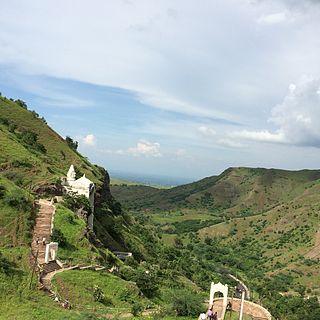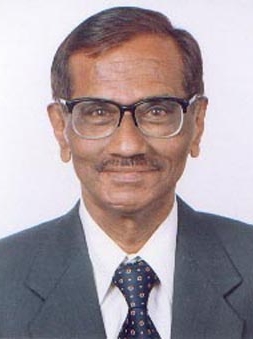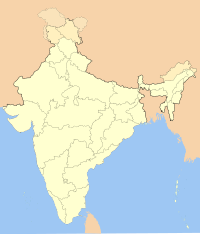Jainism, also known as Jain Dharma, is an Indian religion. Jainism traces its spiritual ideas and history through the succession of twenty-four tirthankars, with the first in the current time cycle being Rishabhadeva, whom the tradition holds to have lived millions of years ago, the twenty-third tirthankara Parshvanatha, whom historians date to the 9th century BCE, and the twenty-fourth tirthankara Mahavira, around 600 BCE. Jainism is considered to be an eternal dharma with the tirthankaras guiding every time cycle of the cosmology. The three main pillars of Jainism are ahiṃsā (non-violence), anekāntavāda (non-absolutism), and aparigraha (asceticism).

Mahavira, also known as Vardhamana, was the 24th tirthankara of Jainism. He was the spiritual successor of the 23rd tirthankara Parshvanatha. Mahavira was born in the early part of the 6th century BCE into a royal Kshatriya Jain family in ancient India. His mother's name was Trishala and his father's name was Siddhartha. They were lay devotees of Parshvanatha. Mahavira abandoned all worldly possessions at the age of about 30 and left home in pursuit of spiritual awakening, becoming an ascetic. Mahavira practiced intense meditation and severe austerities for twelve and a half years, after which he attained Kevala Jnana (omniscience). He preached for 30 years and attained Moksha (liberation) in the 6th century BCE, although the year varies by sect.
Hindus have experienced both historical and ongoing religious persecution and systematic violence, in the form of forced conversions, documented massacres, genocides, demolition and desecration of temples, as well as the destruction of educational centres.

Bawangaja is a famous Jain pilgrim center in the Barwani district of southwestern Madhya Pradesh in India. Located about 6 kilometers south of River Narmada, its main attraction is the world's second largest megalithic statue of Lord Rishabhadeva, the first Jain Tirthankara. The statue is 84 feet (26 m) high. The center is located in the Satpura Range and is about 8 km from a Barwani town.
The Jains in India are the last direct representatives of the ancient Shramana tradition. People who practice Jainism, an ancient religion of the Indian subcontinent, are collectively referred to as Jains.

The Gujarat Freedom of Religion Act (2003) requires religious conversions in Gujarat, India, to be approved by a district magistrate.

Acharya Shri Mahapragya (14 June 1920 – 9 May 2010) was the tenth head of the Svetambar Terapanth order of Jainism. Mahapragya was a saint, yogi, spiritual leader, philosopher, author, orator, and poet.

Punjabi Hindus are adherents of Hinduism who identify linguistically, culturally, and genealogically as Punjabis and are natives of the Punjab region of the Indian Subcontinent. While Punjabi Hindus are mostly found in the Indian state of Punjab, as well as in Haryana, Himachal Pradesh, Delhi and Chandigarh today, many have ancestry across the greater Punjab region, which was partitioned between India and Pakistan in 1947.
Jainism is considered to be a legally distinct religion in India. A section of scholars earlier considered it as a Hindu sect or a Buddhist heresy, but it is one of the three ancient Indian religions. On 27 January 2014, the Government of India explicitly awarded the status of a "minority religion" to the Jain community in India, as per Section 2(c) of the National Commission for Minorities (NCM) Act (NCM), 1992.

Jain symbols are symbols based on the Jain philosophy.

Religion in India is characterised by a diversity of religious beliefs and practices. Throughout India's history, religion has been an important part of the country's culture and the Indian subcontinent is the birthplace of four of the world's major religions, namely, Hinduism, Buddhism, Jainism, and Sikhism, which are collectively known as native Indian Religions or Dharmic Religions.
This article contains the index of articles related to Jainism.
Jainism is an ancient Indian religion belonging to the śramaṇa tradition. It prescribes ahimsa (non-violence) towards all living beings to the greatest possible extent. The three main teachings of Jainism are ahimsa, anekantavada (non-absolutism), aparigraha (non-possessiveness). Followers of Jainism take five main vows: ahimsa, satya, asteya, brahmacharya (chastity), and aparigraha. Monks follow them completely whereas śrāvakas (householders) observe them partially. Self-discipline and asceticism are thus major focuses of Jainism.

Bal Patil was a Jain scholar, journalist, social activist and Jain minority status advocate from Mumbai, Maharashtra. He was appointed as a member of State Minority Commission by the Govt. of Maharashtra from 2001 to 2004. He was the Secretary-General of All India Jain Minority Forum, New Delhi—a position he held until his death—and was an ardent advocate of minority status for Jainism. The Jain minority cause gained prominence when he petitioned the Supreme Court of India for the recognition of Jain religious minority status on par with other Indian minorities as per the two recommendations by the National Minorities Commission. He was also the first non-medical President of the National Society for the Prevention of Heart Disease & Rehabilitation, Mumbai. He has also authored many books on Jainism and presented several papers at various seminars and conferences.

Sushil Kumar was a Jain teacher and monk. He was a self-realized master who devoted more than 50 years to promoting non-violence, peace and knowledge of the self.

Arahanthgiri Jain Math is a Jain Matha that established near Tirumalai in August, 1998. The Math is headed by Bhattaraka Dhavalakeerthi.
There are references in Jain texts to various areas of Southeast Asia. During the reign of Samprati, Jain teachers were sent to various Southeast Asian countries.

The Statue of Ahimsa is located at Mangi-Tungi, in Nashik, in the Indian state of Maharashtra. It is the tallest Jain statue in the world as per Guinness World Records. The statue depicts the first Jain Tirthankara, Rishabhanatha. The statue is 108 feet (33 m) tall – 121 feet (37 m) including pedestal. The statue has been carved out of the Mangi-Tungi hills, which are considered to be sacred by the Jains.
The Citizenship (Amendment) Act, 2019 (CAA) was passed by the Parliament of India on 11 December 2019. It amended the Citizenship Act, 1955 by providing an accelerated pathway to Indian citizenship for persecuted religious minorities from Afghanistan, Bangladesh and Pakistan who are Hindus, Sikhs, Buddhists, Jains, Parsis or Christians, and arrived in India before the end of December 2014. The law does not grant such eligibility to Muslims from these countries. The act was the first time that religion had been overtly used as a criterion for citizenship under Indian law, and it attracted global criticism.

Sarwan Ram Darapuri an Indian social activist, politician and ex-IPS officer. He served as the third-highest-ranking police officer in Uttar Pradesh.














